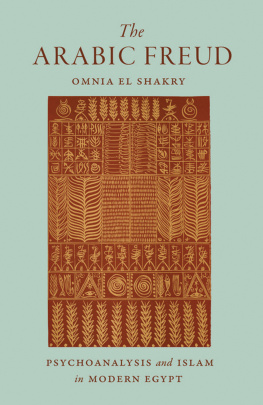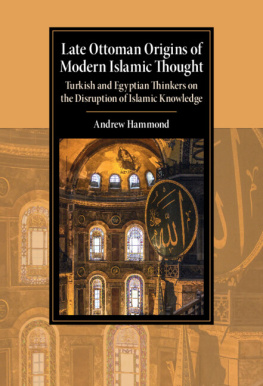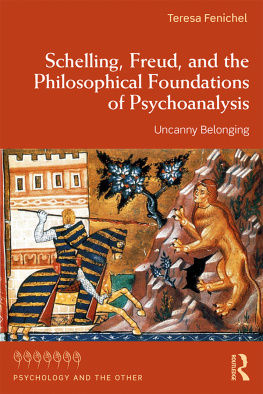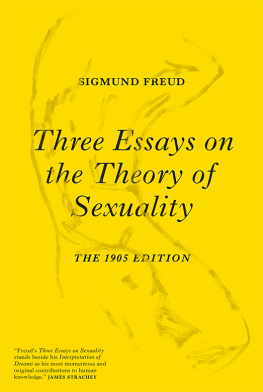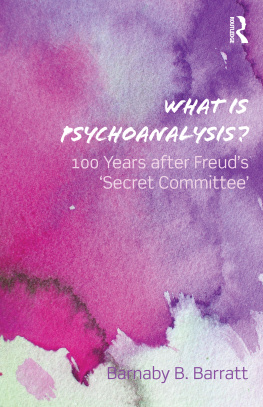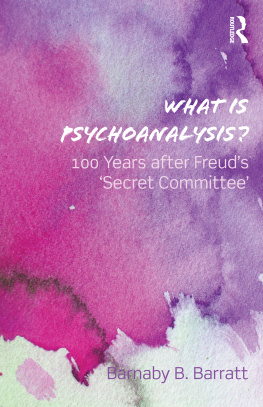
THE ARABIC FREUD
The Arabic Freud
PSYCHOANALYSIS AND ISLAM IN MODERN EGYPT

Omnia El Shakry
PRINCETON UNIVERSITY PRESS
PRINCETON & OXFORD
Copyright 2017 by Princeton University Press
Published by Princeton University Press,
41 William Street, Princeton, New Jersey 08540
In the United Kingdom: Princeton University Press,
6 Oxford Street, Woodstock, Oxfordshire OX20 1TR
press.princeton.edu
Jacket art: Ibn El Arabi by Rachid Korachi (Algeria), 2009.
Lithograph (Set of 8), 60 40 cm (1 of 8)/Artists Rights
Society (ARS), New York
All Rights Reserved
ISBN 978-0-691-17479-2
Library of Congress Control Number 2017940319
British Library Cataloging-in-Publication Data is available
This book has been composed in Miller
Printed on acid-free paper
Printed in the United States of America
10987654321
In Memoriam Michael T. Dreyfus
CONTENTS
ACKNOWLEDGMENTS
AS FREUD REMARKS, every finding is a refinding. This book constitutes, for me, a refinding of an object, the topic of the psyche with which I have remained concerned on and off for a little over a quarter of a century. It thus represents an intellectual odyssey and a (partial) recovery of an earlier self that I thought I had lost. It has returned me to the ephemera of conversations, long forgotten, but still imprinted. It has allowed me to revisit my undergraduate years, which were marked by a concern for schizophrenia and language, concerns that have never left me, but that find only the barest of subtle inlets into this text.
The writing of this book would not have been possible without the generous support of the ACLS Ryskamp fellowship, a Davis Humanities Institute fellowship, and numerous UC Davis research grants, all of which afforded me the opportunity to read far more widely and expansively than I might have otherwise. For allotting time and resources that enabled my work in the first place, I thank former dean George Mangun and department chairs Ted Margadant, David Biale, and Kathryn Olmsted. Suad Joseph and Sally McKee have continued to mentor me, even after I had long aged out.
While in Cairo, Muhammad Ali was a most convivial intellectual interlocutor and tracked down tomes and tomes of books on psychology, psychoanalysis, and the self, virtually all of the primary source material upon which this book is based. Halfway into this project I made the acquaintance of Samir Mourad, who was kind and generous enough to share with me recollections on the life of his father, Youssef Mourad, and facilitate access to primary source materials. I thank him not only for the pleasure of his friendship and conversation, but also for his forbearance in seeing his fathers name transliterated in this text as Yusuf Murad.
Numerous scholars have sharpened my thinking and shaped the writing of this book, largely through sustained commentary at invited talks and seminars. I would especially like to thank the organizers and individual participants at a variety of venues, including the Middle East History colloquium and Anthropology Department at UC Berkeley; the Cultural Studies program, the Anthropology Department, and the Multidisciplinary Psychoanalytic research cluster at UC Davis; the History of Science colloquium, Center for European and Russian Studies, Department of Comparative Literature, and Near Eastern Languages and Cultures at UCLA; the Middle East Studies Center at the University of Pennsylvania; the Middle East and Middle Eastern American Center at the Graduate Center of the City University of New York; the Wissenschaftskolleg zu Berlin; the Womens Studies Program at Duke University; the Center for Middle Eastern Studies at the University of Texas at Austin; the Women and Gender Studies program at Northern Arizona University; and the Institute for Humanities Research at UC Santa Cruz.
Conversations with participants in my 2008 Theorizing the Self Cultural Studies seminar helped me delineate the principal theoretical debates I wished to intervene in. Early presentations given at Beshara Doumanis Middle East History colloquium at Berkeley and at Caren Kaplans Cultural Studies colloquium at UC Davis were especially formative for outlining the parameters of this project. Ranjana Khanna, and participants in her Psychoanalysis in an International Frame seminar at Duke, challenged me to think through a variety of theoretical knots in my work. Presentations given at conferences centered on Middle East, Islamic, or comparative studies at Princeton University, Amherst College, Stanford University, and the University of Chicago were crucial in nourishing a community of scholars with shared interests. The working group on psychoanalysis, hosted by the Psychoanalytic Institute of Northern California and the Townsend Center of the Humanities at Berkeley, offered much-needed inspiration during the final stages of writing.
The larger project upon which this book is based owes a deep intellectual debt to Stefania Pandolfo. Through a formidable body of work, she has explored the nature of subjectivity in the aftermath of colonialism and the interactions between the Islamic discursive tradition and psychoanalysis. A profound and continuous dialogical engagement with her, through conversations, e-mails, and a mutual reading of our work, has indelibly shaped my thinking and the writing of this book.
For providing feedback at a variety of stages of this project, I thank Rifaat Abou-El-Haj, Michael Allan, Paul Amar, Anjali Arondekar, Fadi Bardawil, Beth Baron, Orit Bashkin, Abigail Boggs, Joan Cadden, Patricia Clough, Diana Davis, Yoav Di-Capua, Hoda El Shakry, Marwa Elshakry, Khaled Fahmy, Leah Feldman, Jeff Fort, Kathleen Frederickson, Israel Gershoni, Peter Gran, Samira Haj, Alma Heckman, Naomi Janowitz, Suad Joseph, Ranjana Khanna, Hanan Kholoussy, Aishwary Kumar, Benjamin Lawrance, Philippa Levine, Ellen McLarney, Ali Altaf Mian, Susan Miller, Durba Mitra, Samuel Moyn, Afsaneh Najmabadi, Eve Troutt Powell, Sara Pursley, Michael Saler, Alan Tansman, Robert Tignor, Soraya Tlatli, and Li Zhang.
I want to especially thank Rajbir Judge and Stefania Pandolfo for reading the entire manuscript and providing exacting and constructive criticism. Likewise, reviewers for Princeton University Press provided meticulous comments, encouraging me to knit the manuscript more closely together. I am incredibly fortunate to work with an outstanding group of graduate students at Davis who have sustained me through intellectual conversations and shared political commitments. I am greatly indebted to Rajbir Judge, Stephen Cox, Caroline McKusick, and Laura Tavolacci for their assistance with secondary source material; the final stages of editing; and for the glossary, the bibliography, and the index.
Fred Appel of Princeton University Press was a most gracious editor, soliciting the book and offering sage advice on everything from its title to the substantive concerns of the text. I am appreciative of the care and attention he has devoted to the project. Thalia Leaf and Brigitte Pelner extended invaluable editorial assistance, and I am especially beholden to Dawn Hall for copyediting. I thank Leila El Shakry for introducing me to the work of Rachid Korachi, whose artwork graces this cover.
Jessica Thayer, Matt Salata, Benjamin Lawrance, Michael Gasper, Nesa Azimi, Elizabeth Merchant, Tamara Griggs, Emily Wittman, and Susette Min gave much-needed support, and I thank them for always being there, despite my tendency to disappear. The music of Shaykh Yasin al-Tuhami has accompanied me for decades, and throughout the writing of this book he has deepened my understanding of Ibn Arabi and Ibn al-Farid, but more importantly, provided tranquility in the saddest and most trying of times.
Next page
